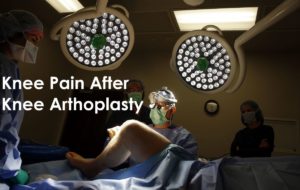Knee Pain After Knee Arthroplasty
Larry had a total knee arthroplasty but after the surgery, he still had constant knee pain. He had decreased range of motion and aching pain in his shin. He couldn’t bear weight or twist without pain in the knee pain. As a result of the knee pain, he has developed a limp that is causing problems with his hip and low back.
He asked his orthopedic surgeon for help with the knee pain but the surgeon didn’t have an answer for Larry. He believed the pain was just scar tissue and referred Larry to pain management medication.
Second Opinion from Dr. Tollestrup

Nerve surgery helped Larry with knee pain.
Larry sought another opinion from Dr. Tollestrup, a peripheral nerve surgeon.
Dr. Tollestrup understands that an orthopedic surgery such as a total knee arthroplasty is rough by nature and can cause nerve damage.
Surgery on the knee joint, whether it is an arthroscopic meniscus repair or a total knee arthroplasty carries with it a small but significant risk of damage to one or more nerves. The trauma to the soft tissue envelope surrounding the knee joint causes swelling, inflammation and scarring that can entrap nerves causing severe pain with motion of the joint.
Patients like Larry who end up in this situation undergo multiple additional orthopedic knee surgeries before finally being consigned to the pain management realm. Once the pain generator is a damaged sensory nerve, it doesn’t matter how many additional orthopedic surgeries the patient has, the pain will not get better and frequently can be made worse.
Dr. Tollestrup examined Larry, listened to history and then ordered a diagnostic block that completely took away Larry’s knee pain. This proved Dr. Tollestrup’s hypothesis that the pain was due to damaged nerves, not some type of residual orthopedic issue.
Disconnecting Damaged Nerves
A detailed understanding of the nerve anatomy around joints provides the option of joint denervation procedure. In this surgery, Dr. Tollestrup locates the damaged nerves, disconnects them and buries them upstream from the area of injury. These nerves can then be handled in specific ways to prevent additional inappropriate stimulation and the formation of painful neuromas. This serves to shut off the pain signal to the patient’s brain and eliminate the sensation of pain in the knee area.
Larry underwent a denervation surgery by Dr. Tollestrup, relieving his chronic knee pain.
A few weeks after surgery, Larry told Dr. Tollestrup his knee pain is 90% gone. He is even playing golf again!
If you or someone you love has knee pain after a knee arthroplasty Dr. Tollestrup can help with peripheral nerve surgery. Fill out the form on this page or call the office at 702-666-0463.
